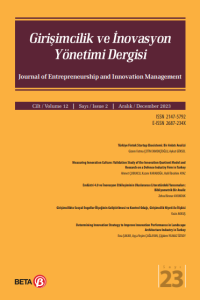Abstract
References
- Abdul-Halim, H. et al. (2019) ‘Innovation Culture in SMEs: The Importance of Organizational Culture, Organizational Learning and Market Orientation’, Entrepreneurship Research Journal, 9(3), pp. 1–14. doi: 10.1515/erj-2017-0014.
Measuring Innovation Culture: A Validation Study of the Innovation Quotient Model and a Research on a Defense Industry Firm in Turkey
Abstract
Innovation activities have structural, social, and environmental impacts on societies. The emergence of these activities is closely related to societal and cultural characteristics. As a result, culture is a historical process that reveals and shapes the values, lifestyles, and thoughts of those who live in society. This process creates an organizational culture that allows firms to absorb innovations. Therefore, organizational culture and innovation culture are inextricably linked. While the innovation management literature progresses over a wide range, culture, one of its most essential parts, has been a relatively less focused area. Although there are some studies on innovation culture, there is not much consensus on measuring innovation culture. This study assesses the construct validity and reliability of the Innovation Quotient instrument, which measures innovation culture in firms across the broad spectrum. The instrument's dimensions were examined, and we tried to validate the instrument. We conducted the instrument on 1432 employees of a Turkish defense industry firm. The model's results were evaluated, and the model's new structure was presented. As a result of the study, we reached three main points: 1. Cultural structure and regional innovation ecosystem affect the measurement of innovation culture 2. The lack of a corporate innovation management system in a firm prevents some questions about innovation culture from being understood 3. To measure the innovation culture in firms, cultural indicators such as the behavior of the managers, the working climate, and the values should be considered initially rather than the input, output, or performance indicators of innovation.
References
- Abdul-Halim, H. et al. (2019) ‘Innovation Culture in SMEs: The Importance of Organizational Culture, Organizational Learning and Market Orientation’, Entrepreneurship Research Journal, 9(3), pp. 1–14. doi: 10.1515/erj-2017-0014.
Details
| Primary Language | English |
|---|---|
| Subjects | Business Administration |
| Journal Section | Research Articles |
| Authors | |
| Publication Date | December 22, 2023 |
| Published in Issue | Year 2023 Volume: 12 Issue: 2 |


